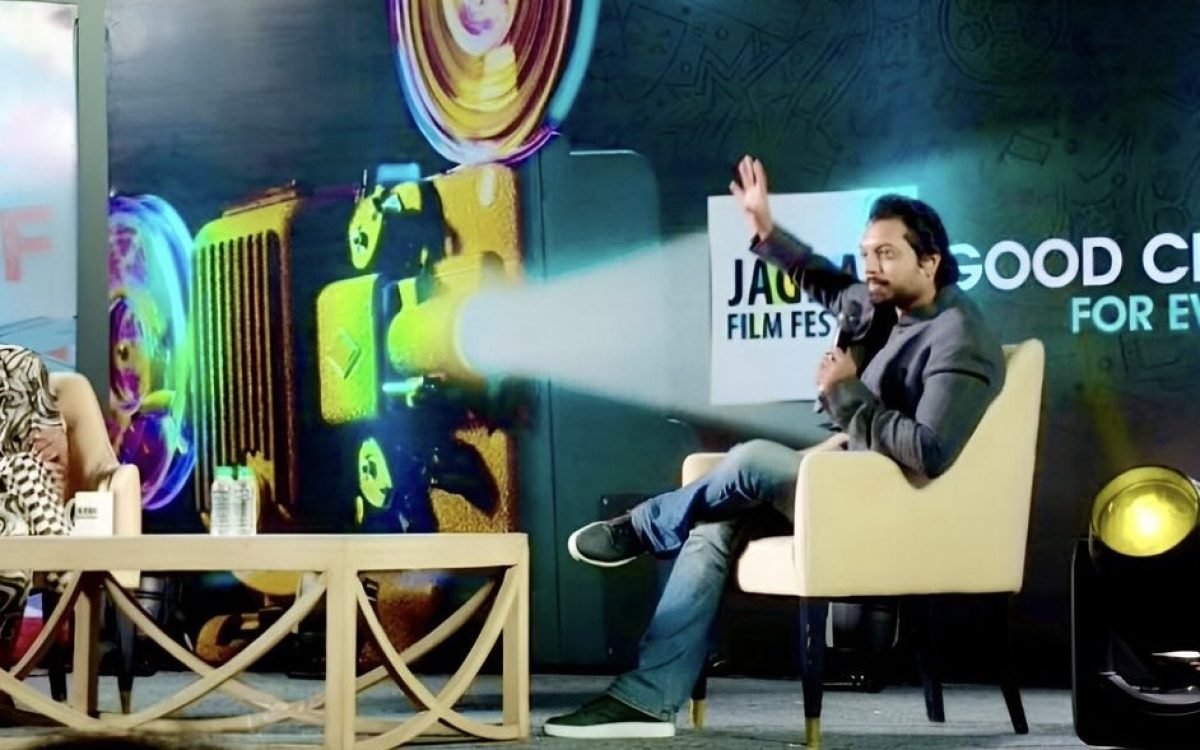The much-anticipated docudrama Rhythm of Heritage: The Untold Story of Pandit Ram Mohan Maharaj made a significant mark at the prestigious Jagran Film Festival (JFF) 2024-2025, with special screenings in Lucknow and Mumbai. The film, directed by renowned filmmaker Harsh Mohan Mishra, received immense appreciation from the festival’s jury and audience, further cementing its place as an important cinematic contribution to Indian culture and heritage.
The film beautifully captures the life and journey of the Kathak dance maestro Pandit Ram Mohan Maharaj, a living legend of Kathak, as he continues his relentless efforts to preserve the essence of classical Indian dance. Through his struggles, dedication, and unwavering spirit, the docudrama sheds light on the gradual decline of traditional art forms and the urgent need for cultural preservation in modern times.
A Masterpiece Celebrated by JFF’s Esteemed Jury
The screening of Rhythm of Heritage at Jagran Film Festival 2024-2025 was a momentous occasion for Indian cinema. The festival, known for showcasing films that bring impactful storytelling and cultural significance to the forefront, found Harsh Mohan Mishra’s film to be a cinematic gem that pays homage to India’s artistic traditions.
The jury members praised the film for its emotional depth, cinematic excellence, and its ability to educate and inspire audiences about the richness of Kathak dance. The storytelling, which blends real-life interviews, archival footage, and dramatized sequences, was lauded for its authenticity and compelling narrative.
Rhythm of Heritage is not just a film—it is a cultural movement. It captures the essence of Pandit Ram Mohan Maharaj’s dedication and urges the younger generation to embrace their roots. This is a film that will stand the test of time.

Harsh Mohan Mishra on the Changing Landscape of Filmmaking
As part of the festival’s special events, Harsh Mohan Mishra was invited for an exclusive conversation on the art of filmmaking and the growing influence of Artificial Intelligence (AI) in the film industry.
During the discussion, Harsh Mohan Mishra spoke about the challenges of making Rhythm of Heritage and the significance of preserving classical art through cinema. He highlighted how traditional storytelling and technological advancements must go hand in hand to ensure that films continue to inspire and educate.


On the topic of AI, Mishra shared thought-provoking insights on its impact on modern filmmaking. He discussed how AI-driven tools are revolutionizing VFX, scriptwriting, editing, and even cinematography, making production processes more efficient. However, he also cautioned against the over-reliance on AI, emphasizing the importance of human creativity, cultural consciousness, and emotional storytelling.
AI can assist in filmmaking, but it cannot replace the soul of a film. Our emotions, our traditions, and our experiences make storytelling powerful. We must use AI as a tool, not as a substitute for creative expression, said Harsh Mohan Mishra during the panel discussion.
A Film That Sets a Benchmark in Cultural Storytelling
Rhythm of Heritage is not just a film; it is a testament to India’s artistic legacy and the individuals striving to keep it alive. The film follows the journey of a young researcher, played by actress Rishika, who embarks on a quest to rediscover the legendary Kathak maestro Pandit Ram Mohan Maharaj. As she delves deeper into his life, she witnesses the struggles of a classical artist in an era dominated by modern entertainment, where traditional art forms are often overlooked.
Despite challenges, the film portrays Pandit Ram Mohan Maharaj’s unbreakable spirit, his passion for Kathak, and his dream of bringing it to larger audiences. The emotional climax of the film—where the maestro’s perseverance finally leads to a grand performance in Mumbai—left the audience at Jagran Film Festival (JFF) deeply moved.
Audience Reactions and Industry Impact
Following the screenings, Rhythm of Heritage received a standing ovation, and social media was flooded with positive reactions. Many viewers expressed how the film inspired them to reconnect with their cultural heritage.
A young filmmaker attending the festival shared, “This film has reignited my love for classical arts. It is a reminder that cultural heritage must not only be cherished but actively preserved.”
Film critics and scholars also took note of Harsh Mohan Mishra’s work, recognizing it as a benchmark in cultural storytelling. Some even suggested that the film should be screened in educational institutions to create awareness among younger generations about the rich legacy of Indian classical dance.
What’s Next for *Rhythm of Heritage?
With its success at JFF, Rhythm of Heritage is now poised for national and international film festivals in 2025. The film’s universal message of preserving cultural traditions has the potential to resonate with audiences worldwide.
Speaking about the film’s future, Harsh Mohan Mishra shared, “This is just the beginning. I want the world to see the brilliance of Pandit Ram Mohan Maharaj and understand why classical arts are so important. We are planning further screenings, and hopefully, this film will spark a movement toward preserving our heritage.”
Conclusion: A Triumph for Indian Cinema and Culture
Rhythm of Heritage has set a new standard for cultural documentaries in India. By bringing the extraordinary journey of Pandit Ram Mohan Maharaj to the screen, Filmmaker Harsh Mohan Mishra has not only paid tribute to a legendary artist but also ignited a conversation about the importance of preserving India’s artistic traditions.
With its overwhelming reception at Jagran Film Festival 2024-2025, the film stands as a powerful reminder that cinema is not just entertainment—it is a medium to protect, educate, and inspire. As Rhythm of Heritage continues its journey to film festivals and wider audiences, it remains a beacon of cultural pride and artistic perseverance.









